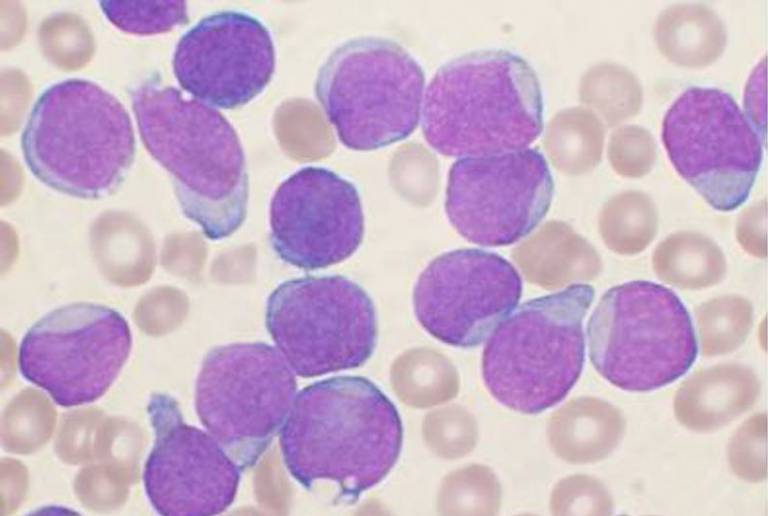Advances in treatment for adult leukaemia highlighted by national trial results
13 May 2022
The first clinical results published from UKALL14 - a trial looking at new combinations of treatment for adult acute lymphoblastic leukaemia (ALL) - point the way to improving treatment of the disease in older adult patients.

Published in the Lancet Haematology, two simultaneous studies describe clinical outcomes from two of the trial’s main questions: investigating the benefit of using targeted treatment - an antibody called rituximab - alongside standard chemotherapy for people with B-cell ALL; and whether the success of donor stem cell transplants for patients over 40 years of age with T- and B-cell ALL could be improved by using lower and less toxic doses of chemotherapy (reduced intensity conditioning).
Acute lymphoblastic leukemia (ALL) is a type of cancer in which the bone marrow makes too many lymphocytes (a type of white blood cell). While most cases of ALL occur in children and young adults, older adults are affected too. Chemotherapy and stem cell transplantation are routinely used to treat the disease. However, therapies are far more successful in children than adults. The overall survival of adults with ALL using standard chemotherapy is only 40–50% and typically outcomes get worse with increasing age. To try and address this, the UKALL14 study was set up to look at ways to improve treatment in older patients.
Largest prospective ALL trial to date
Beginning over 10 years ago, the UKALL14 trial is one of the largest prospective trials in adult ALL to date. Led by Adele Fielding, Professor in Haematology at UCL and Honorary Consultant in Haematology at UCLH, UKALL14 recruited over 900 patients aged 25–65 years, with newly diagnosed B-cell and T-cell acute lymphoblastic leukaemia, from all haematology centres which treat ALL across the UK.
Speaking of the results, Professor Fielding, Chief Investigator of the study and corresponding author of the UKALL14 B-cell study publication, said: “The results from UKALL14 suggest that four doses of rituximab can be beneficial in adult ALL. However, four doses are unlikely to be enough - the full benefit of rituximab in adult ALL requires use of the drug not just at the beginning but throughout the therapy. We saw that the rituximab treatment effect was greatest for those who received high-intensity (using high-doses of chemotherapy) donor stem cell transplants, where there was a significantly greater event-free survival for adult patients with B-cell ALL treated in the rituximab group.”
Improving transplant outcomes
Trial management group member and study investigator, David Marks, Professor of Hematology and Senior Transplant Physician of the Bristol Bone Marrow Transplant Unit at the University Hospitals Bristol and Weston NHS Foundation Trust, UK, took the lead in how bone marrow transplant was investigated in the study:
“Survival in older patients (over 40 years of age) with ALL is poor with chemotherapy. In this sub study we asked whether using a less aggressive combination of chemotherapy (reduced intensity conditioning) to prepare the patient for a donor (allogeneic) stem cell transplant could improve their outcome, with a lower chance of transplant related mortality, previously an issue in the older patient group.”
“This is by far the largest prospective evaluation of reduced intensity conditioning allogeneic transplant ever performed so this trial provides the most robust evidence for this type of transplant in adults with ALL,” explained Professor Marks.
The results the team saw were striking - “In a high-risk group of 249 patients with a median age of 50, survival at four years was 55%, which far surpassed our expectations. Graft versus Host Disease (GVHD - where the transplant causes an immune reaction against the body) was low and our assessments showed that quality of life was maintained in most patients. The results can be further improved by reducing relapse and infection - the follow-on trial, ALL-RIC is addressing these issues,” said Professor Marks.
Professor Fielding added: “We are extremely grateful to NHS staff and patients for participating in this study and for the support of CRUK and UCL Cancer Trial Centre for study coordination and management. These are only the first results from some of the questions we have asked in UKALL14. We are still analysing data from some of the other clinical questions in the study and also have a lot of scientific questions we are trying to answer about ALL using the clinical data and the specimens that participants have generously donated.
Funding support for this study was provided by Cancer Research UK Cancer Research UK.
Further information
- Professor Adele Fielding academic profile
- Professor David Marks profile
- Research paper: Addition of four doses of rituximab to standard induction chemotherapy in adult patients with precursor B-cell acute lymphoblastic leukaemia (UKALL14): a phase 3, multicentre, randomised controlled trial. The Lancet Heamatology
- Research paper: In-vivo T-cell depleted reduced-intensity conditioned allogeneic haematopoietic stem-cell transplantation for patients with acute lymphoblastic leukaemia in first remission: results from the prospective, single-arm evaluation of the UKALL14 trial. Lancet Heamatology
- Comment: Novel strategies in the treatment of acute lymphoblastic leukaemia. Lancet Haematology
- Cancer Research UK: UKALL14 trial
- Main image: Acute Lymphoblastic Leukaemia - VashiDonsk/Wikimedia Commons
 Close
Close

